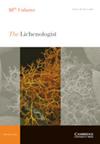在地衣学上我们能相信自然主义者吗?评估人工智能在地衣鉴定中的有效性和可靠性
IF 1.4
4区 生物学
Q4 MYCOLOGY
引用次数: 0
摘要
iNaturalist是一个广泛使用的非专业志愿者数据收集和共享平台,被广泛应用于公民科学。该平台的数据还广泛用于科学研究,包括跟踪物种分布的变化,监测外来入侵物种的传播,以及评估城市化和土地利用变化对生物多样性的影响。由于地衣常年生长在树木、土壤和岩石上,其形状和颜色各异,引起了iNaturalist用户的注意,地衣记录在该平台上得到了广泛的展示。然而,由于地衣鉴定的复杂性,在科学调查中使用未经训练或训练不足的志愿者收集的数据引起了地衣学家的关注。为了解决这些问题,本研究通过比较iNaturalist用户在平台上的记录与专家(经验丰富的地衣学家)在开发公民科学项目的三个城市进行的鉴定,评估了地衣鉴定的可靠性。这项研究的结果提醒人们不要使用从该平台获得的未经检查的地衣学数据,表明iNaturalist用户和专家收集的结果之间存在实质性的不一致。本文章由计算机程序翻译,如有差异,请以英文原文为准。
Can we trust iNaturalist in lichenology? Evaluating the effectiveness and reliability of artificial intelligence in lichen identification
Abstract iNaturalist is a widely-utilized platform for data collection and sharing among non-professional volunteers and is widely employed in citizen science. This platform's data are also used in scientific studies for a wide range of purposes, including tracking changes in species distribution, monitoring the spread of alien-invasive species, and assessing the impacts of urbanization and land-use change on biodiversity. Lichens, due to their year-round presence on trees, soil and rocks, and their diverse shapes and colours, have captured the attention of iNaturalist users, and lichen records are widely represented on the platform. However, due to the complexity of lichen identification, the use of data collected by untrained, or poorly trained volunteers in scientific investigation poses concerns among lichenologists. To address these concerns, this study assessed the reliability of lichen identification by iNaturalist users by comparing records on the platform with identifications carried out by experts (experienced lichenologists) in three cities where citizen science projects were developed. Results of this study caution against the use of unchecked data obtained from the platform in lichenology, demonstrating substantial inconsistency between results gathered by iNaturalist users and experts.
求助全文
通过发布文献求助,成功后即可免费获取论文全文。
去求助
来源期刊

Lichenologist
生物-真菌学
CiteScore
2.90
自引率
14.30%
发文量
23
审稿时长
6.0 months
期刊介绍:
The Lichenologist is the premier scientific journal devoted exclusively to the study of lichens worldwide. As the leading forum for the dissemination of new concepts and topical reviews, The Lichenologist reaches more scientists concerned with the study of lichens and lichen symbionts than any other single journal. All aspects of lichenology are considered including systematics and phylogenetics; molecular biology; ultrastructure, anatomy and morphology; secondary chemistry, effects of pollutants and use as bioindicators; biogeography. In addition to standard length research papers, the journal also publishes Short Communications and Book Reviews. A monthly issue may occasionally be devoted to papers deriving from a symposium.
 求助内容:
求助内容: 应助结果提醒方式:
应助结果提醒方式:


